This article explores the pivotal role of hotels and technology in enhancing guest experiences through innovative solutions. Advanced booking systems, augmented reality, contactless technology, and personalized mobile apps are at the forefront of this transformation. By streamlining processes and offering immersive experiences, these technologies significantly boost guest satisfaction. Moreover, they tailor services to individual preferences, ultimately fostering increased loyalty and revenue within the hospitality sector. As hotel and restaurant owners seek effective solutions to their challenges, understanding these innovations is crucial for staying competitive.
The hospitality industry is experiencing a transformative shift as technology becomes integral to enhancing guest experiences. From sophisticated booking engines to immersive augmented reality, hotels are leveraging innovative solutions to not only meet but exceed visitor expectations. However, as establishments race to adopt these advancements, a pressing question emerges: how can they ensure that these technologies genuinely enhance guest satisfaction rather than complicate the experience? This article explores nine pivotal ways in which hotel and technology are reshaping interactions, driving loyalty, and optimizing operational efficiency in an increasingly competitive landscape.
Sophisticated reservation systems revolutionize the booking process by enabling visitors to check availability, evaluate pricing, and finalize arrangements in real-time. This advancement not only captures attention but also builds interest among hotel and technology owners seeking solutions to enhance their operations.
By integrating user-friendly interfaces and ensuring mobile compatibility, establishments significantly elevate the reservation experience, leading to increased conversion rates. Furthermore, collaborating with leading reservation system suppliers equips hotels with advanced analytics, allowing them to tailor offerings based on visitor preferences and behaviors.
This data-driven strategy not only enhances visitor satisfaction but also by minimizing dependence on external reservation platforms. In fact, businesses in the hotel and technology sector leveraging online booking technologies have reported revenue increases exceeding 20%, underscoring the critical role of effective booking systems in the hospitality industry.
This compelling evidence prompts action, urging establishments to invest in robust reservation solutions for sustained success.
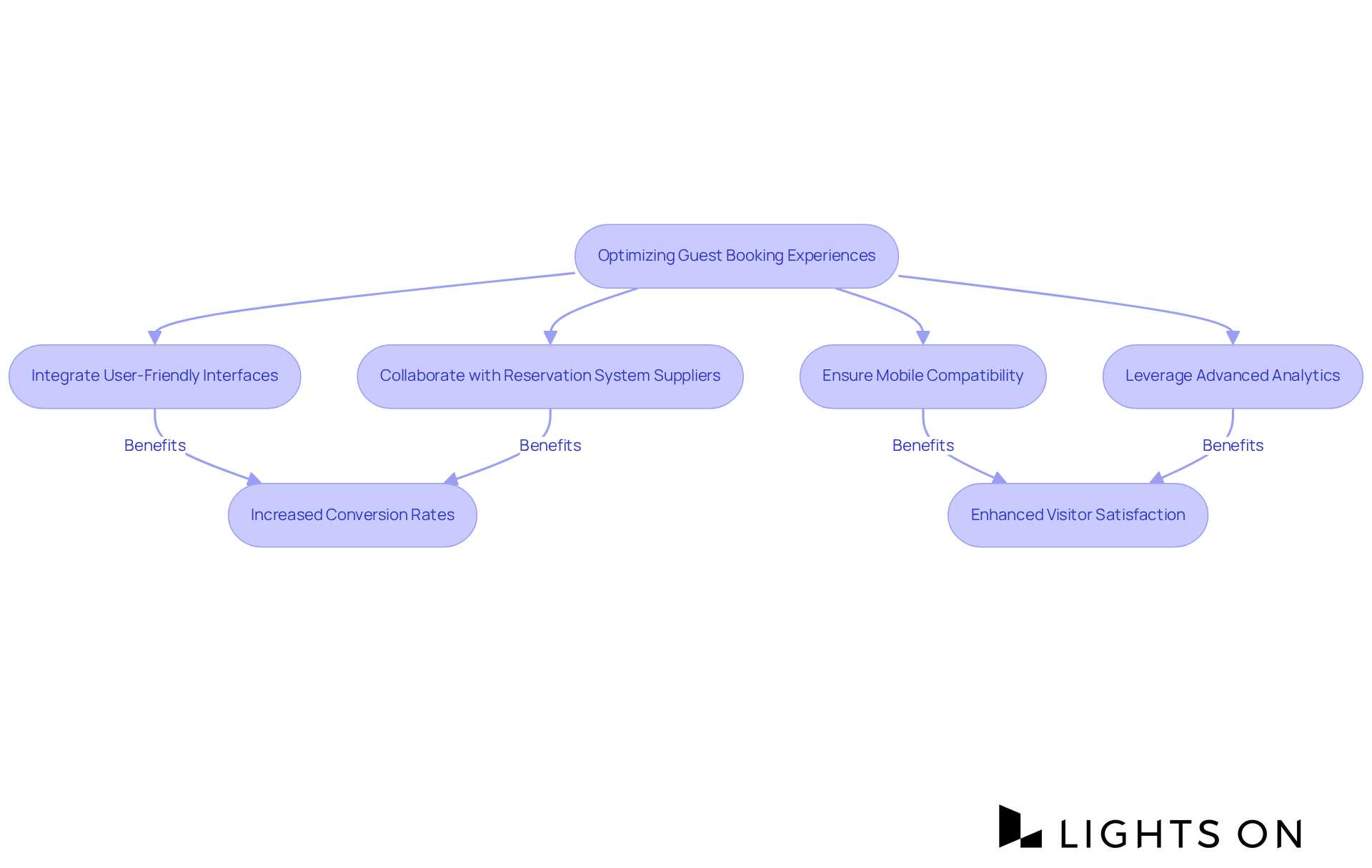
Augmented reality (AR) applications in accommodations are revolutionizing visitor interactions, offering a range of features from virtual property tours to interactive dining options. For instance, visitors can utilize their smartphones to access detailed information about amenities or local attractions simply by pointing their device at specific locations. This interactive approach not only enhances the visitor's engagement but also fosters exploration and interaction with the environment.
Notably, Holiday Inn has effectively implemented AR for virtual 360º tours, enabling potential guests to explore room options and amenities prior to booking, thereby improving [customer satisfaction and driving reservations](https://lightson.co/category/10-essential-hospitality-websites-for-owners-to-boost-revenue). Furthermore, by integrating AR into promotional strategies, accommodations can attract tech-savvy tourists seeking unique experiences, ultimately bolstering customer loyalty.
To effectively promote AR offerings, property owners should consider:
As the AR market in travel and tourism is projected to expand significantly, with a compound annual growth rate of 38.0% from 2024 to 2025 and expected to reach $109.13 billion by 2029 at a CAGR of 38.6%, the potential for accommodations to leverage this technology for enhanced visitor interaction is substantial. This trend underscores the necessity of adopting in hotel and technology to remain competitive in the evolving hospitality landscape.

Contactless technology solutions—such as mobile check-in/check-out, digital room keys, and contactless payment options—have fundamentally transformed the visitor experience in the hotel and technology sector. These innovations significantly reduce physical contact, effectively addressing while streamlining operations.
For instance, a striking 75% of travelers now favor accommodations that provide mobile check-in and keyless entry options, indicating a robust demand for convenience and safety. By adopting hotel and technology, accommodations enhance visitor safety and boost operational efficiency, enabling staff to focus on delivering outstanding service.
The outcome is a notable rise in visitor satisfaction rates, with establishments reporting up to a 20% increase in returning customers associated with user-friendly digital features. Effectively promoting these contactless solutions can attract health-conscious travelers, positioning accommodations as leaders in prioritizing visitor safety and convenience.
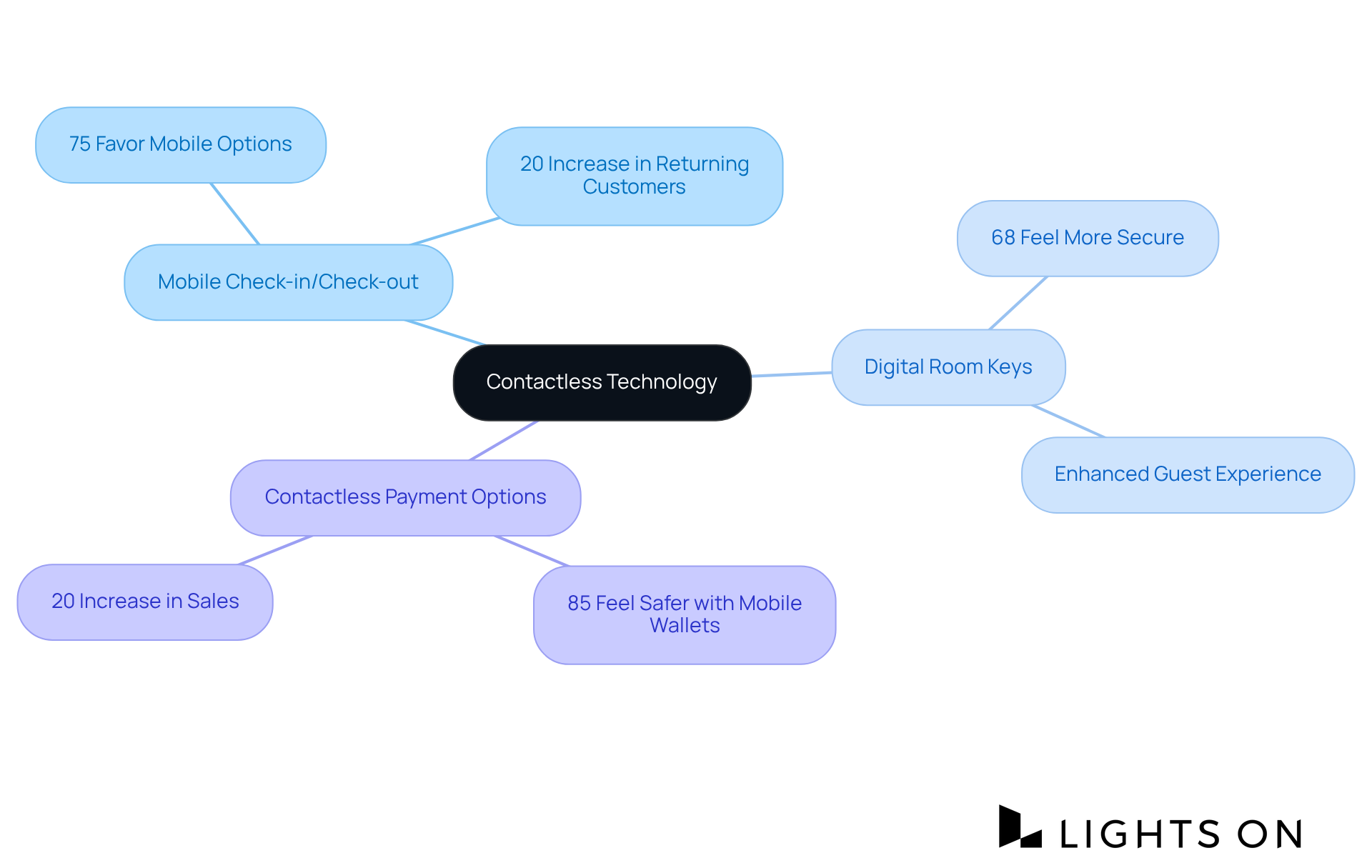
Mobile applications are revolutionizing visitor interactions by offering tailored services through functionalities such as in-app messaging, location-based offers, and real-time notifications on room availability. This innovation addresses the challenge of , allowing accommodations to utilize visitor information to provide bespoke suggestions and services, ensuring that each individual feels acknowledged and valued. This seamless interaction between visitors and accommodation personnel facilitates rapid resolution of requests, significantly enhancing the overall experience.
Research indicates that hotels leveraging mobile apps for upselling experience a 20% increase in ancillary revenue, underscoring the financial advantages of personalization. Furthermore, individuals engaged in mobile app-based loyalty programs are 30% more likely to return, highlighting the critical role of personalized interactions in fostering loyalty.
As Andrew Custage from Medallia Market Research articulates, "It’s no surprise to see the clear link between personalization and satisfaction," emphasizing that this level of personalization not only boosts customer satisfaction but also encourages positive reviews and referrals, thereby establishing a cycle of repeat business and enhanced brand reputation.
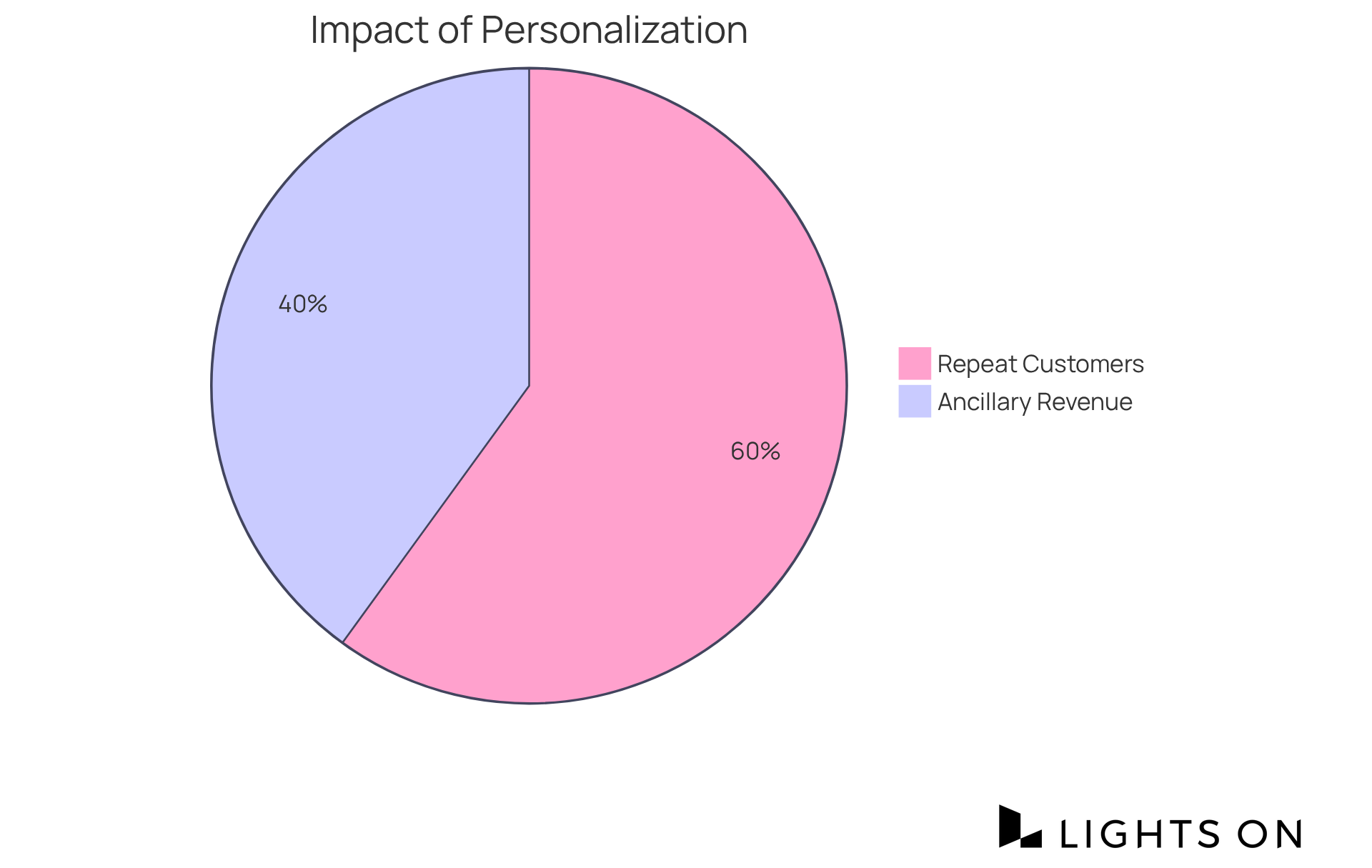
Smart technology solutions, particularly IoT devices, empower visitors in the hotel and technology sector to manage room settings—such as lighting, temperature, and entertainment—through smartphones or voice commands, significantly enhancing their comfort and satisfaction. This level of is increasingly anticipated, with 75% of visitors favoring the ability to control their surroundings through hotel and technology.
Furthermore, hotel and technology, specifically IoT devices, streamline operations in accommodations by automating routine tasks, including:
These automations can yield energy savings of 10% to 30%. For instance, accommodations utilizing occupancy sensors can adjust lighting and temperature based on visitor presence, thereby enhancing both comfort and efficiency.
By effectively promoting these innovations, hotel and technology establishments can attract tech-oriented visitors seeking contemporary interactions, ultimately boosting operational efficiency and customer loyalty. The integration of intelligent technology in hotels and technology not only elevates visitor experiences but also positions accommodations competitively in a rapidly evolving market.
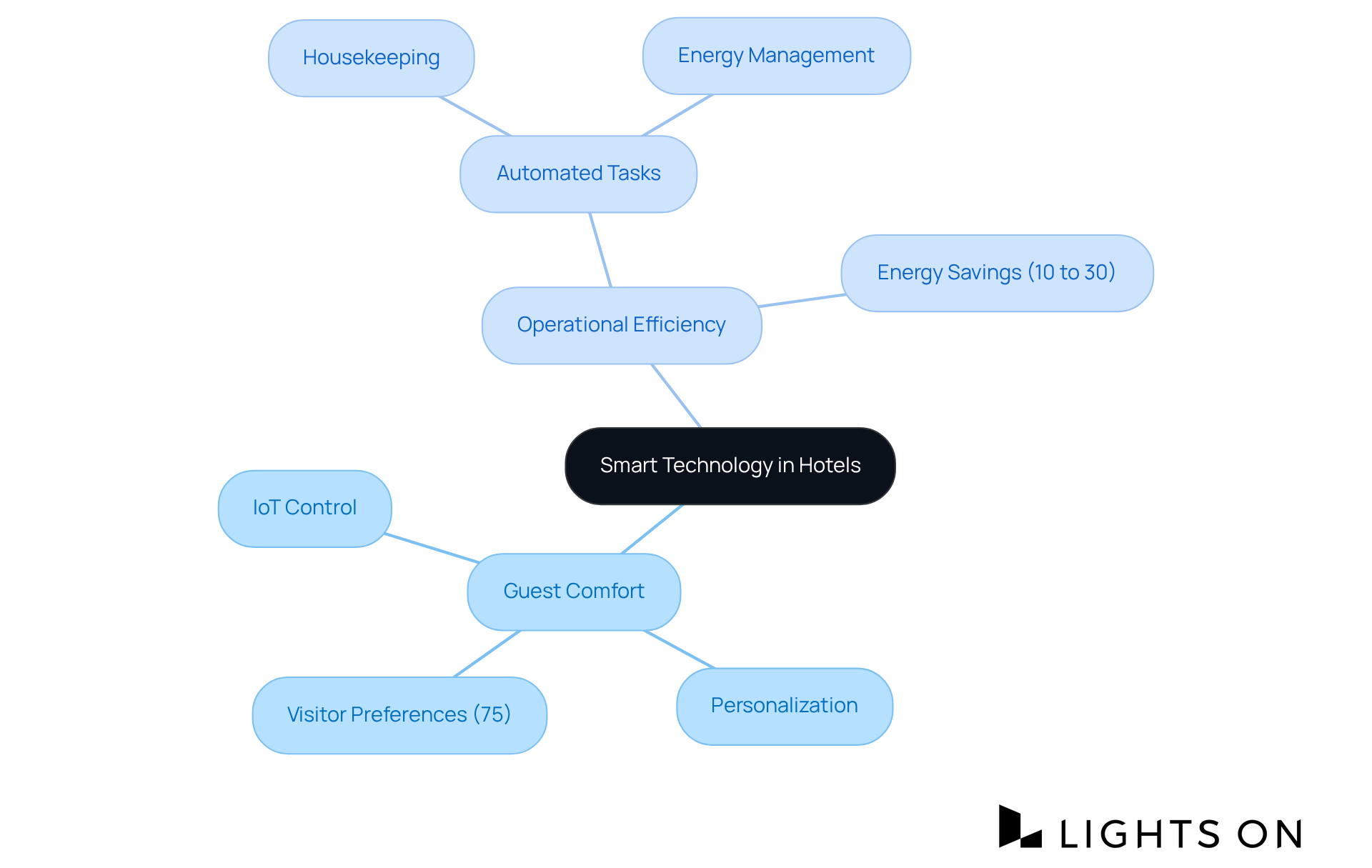
By utilizing visitor information from various sources, hotel and technology can help uncover valuable insights into preferences, reservation patterns, and customer feedback. This data-driven strategy not only facilitates the development of targeted marketing campaigns but also effectively engages specific visitor segments.
For instance, personalized email promotions based on previous stays can significantly boost repeat bookings. Furthermore, data analysis empowers accommodations to recognize emerging trends and adapt their services to meet evolving visitor expectations. This proactive approach not only enhances overall but also drives substantial revenue growth.
The incorporation of advanced analytics tools allows accommodations to tailor their marketing strategies, ensuring they connect with their audience and foster lasting customer loyalty.

Virtual reality (VR) is revolutionizing the hospitality sector by creating immersive experiences that allow prospective visitors to explore accommodations and rooms before making a reservation. For instance, VR tours can emphasize unique features and nearby attractions, effectively enticing travelers to choose a specific property. A study by Omni Hotels revealed that visitors who experienced virtual reality tours were 67% more likely to book online, underscoring the effectiveness of this innovative marketing strategy.
To leverage VR effectively, hotels should implement the following strategies:
Furthermore, VR enhances on-location interactions through virtual concierge services and engaging entertainment options, providing visitors with a seamless blend of technology and hospitality. AI-driven concierges can manage tasks such as restaurant recommendations and room service requests, further elevating visitor satisfaction. As accommodations increasingly adopt VR, they can differentiate themselves in a competitive market, attracting tech-savvy travelers who seek unique and engaging experiences. This integration of VR not only bolsters marketing efforts but also enriches the overall visitor experience, making it a vital tool for modern hospitality businesses that focus on hotel and technology. Moreover, the potential for VR to increase revenue through upselling and cross-selling services adds another layer of value to its implementation.

AI-driven chatbots are revolutionizing visitor interactions within the hospitality industry by adeptly managing a range of inquiries related to hotel and technology, from booking assistance to detailed information about hotel amenities. With their capacity to provide , these chatbots significantly enhance the visitor experience by ensuring that assistance is perpetually accessible. Notably, 70% of visitors find chatbots beneficial for straightforward questions, underscoring their effectiveness in elevating customer service.
Furthermore, chatbots are engineered to learn from each interaction, allowing them to offer increasingly personalized responses over time. This adaptability not only boosts visitor satisfaction but also enables staff to concentrate on more complex tasks, thereby enhancing overall operational efficiency. For instance, accommodations utilizing AI chatbots have reported a notable increase in visitor satisfaction, with many observing improved engagement and loyalty.
The successful integration of chatbots in hospitality has demonstrated tangible benefits, such as reduced response times and improved accuracy in the information provided to visitors. By automating routine inquiries, accommodations can optimize operations and allocate resources more effectively, ultimately resulting in a more gratifying experience for visitors and a more productive atmosphere for personnel.
As AI adoption and investment in the hospitality sector are projected to surge by 60% annually from 2023 to 2033, property owners should seriously consider integrating AI chatbots into their operations. Specific case studies, such as MARA's AI Review Assistant and Canary Messages Guest Messaging Software, illustrate how chatbots can enhance visitor interactions and operational efficiency. Moreover, with the hotel and technology market in hospitality expected to surpass $8 billion by 2033, the importance of embracing these technologies is paramount. To leverage AI chatbots effectively, property owners should prioritize training these systems to comprehend their unique visitor profiles and preferences, ensuring a customized experience that fosters loyalty.
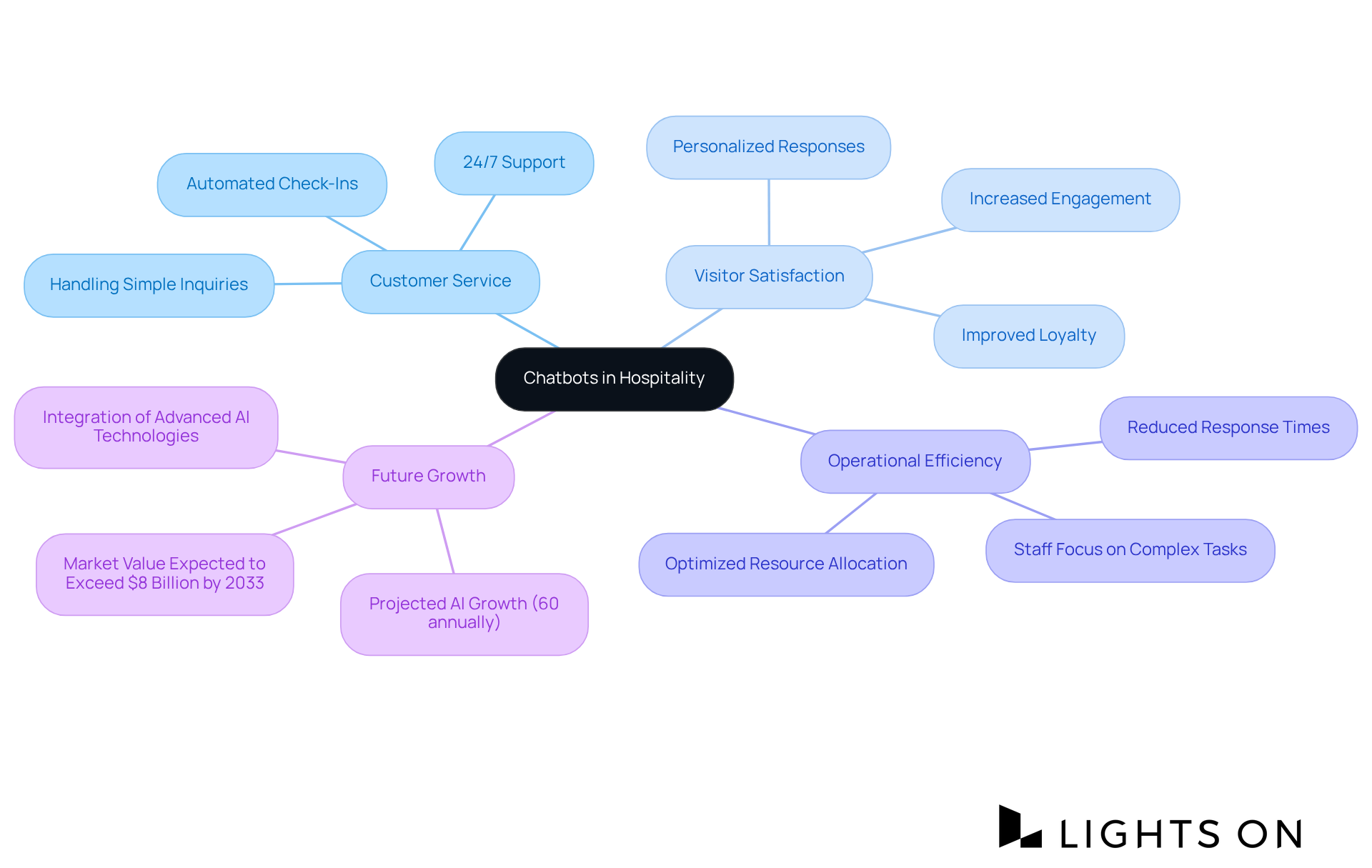
By adopting energy-saving technologies, including smart thermostats, LED lighting, and advanced energy management systems, hotel and technology can significantly mitigate their environmental impact. These innovations not only lower operational expenses—energy costs typically account for 6-8% of an establishment's total expenditures—but also resonate with visitors who prioritize sustainability. Indeed, approximately three-quarters of high-end travelers are willing to pay a premium for sustainable options, underscoring a robust market demand for eco-friendly practices.
Promoting these through targeted marketing campaigns can effectively attract eco-conscious travelers, thereby enhancing the establishment's brand image. For instance, Iberostar Hotels & Resorts achieved a remarkable 25% reduction in energy demand from climate control systems by integrating smart technologies, illustrating how operational efficiency in the hotel and technology industry can align with visitor expectations.
Furthermore, emphasizing sustainability initiatives can lead to favorable visitor experiences and foster loyalty, as patrons increasingly seek accommodations that reflect their environmental values. By providing personalized eco-friendly amenities and highlighting energy-saving measures, hotels can craft memorable stays that not only meet but exceed guest expectations, ultimately driving repeat business and enhancing overall satisfaction.
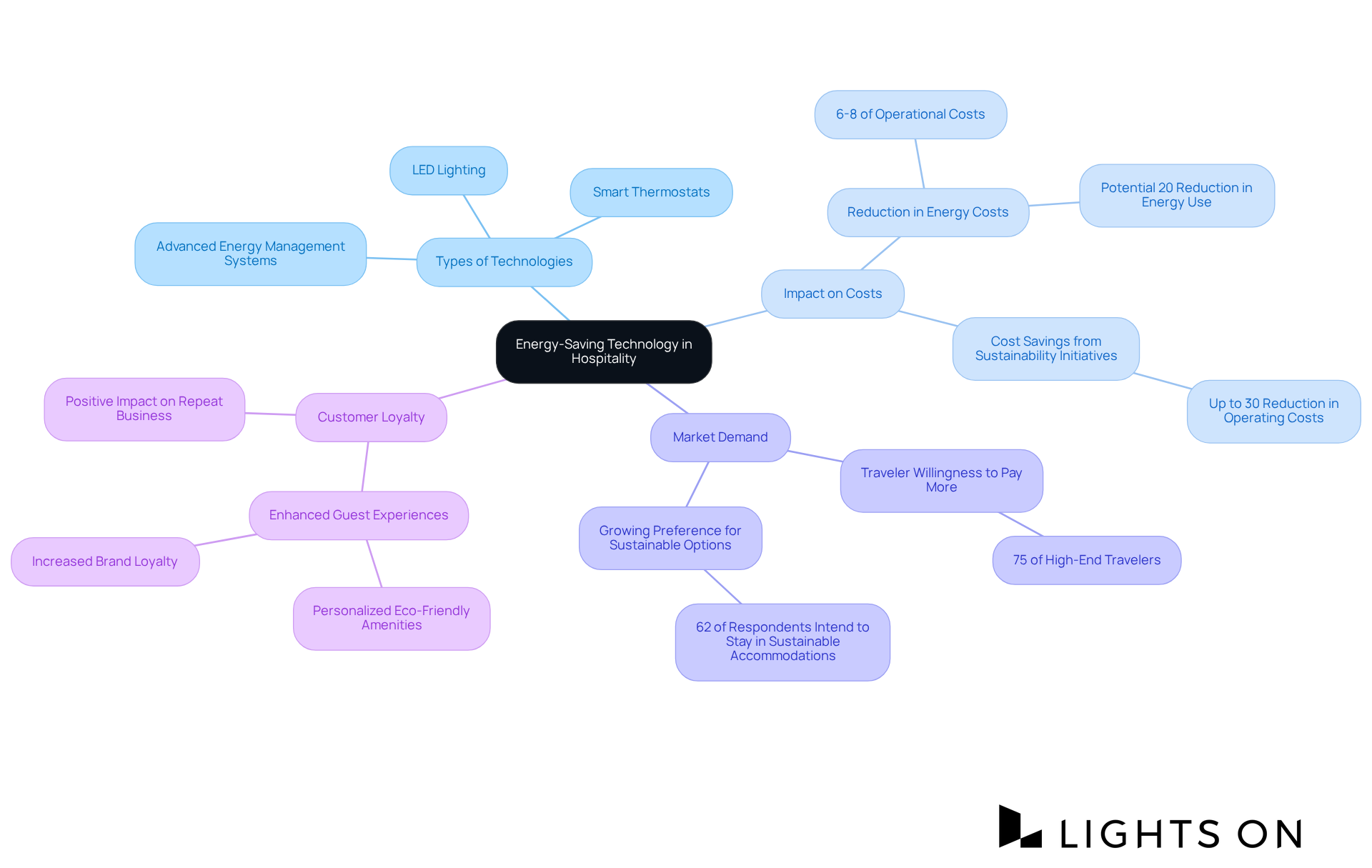
The integration of advanced technology within the hospitality sector is reshaping guest experiences in unprecedented ways. From sophisticated booking engines to immersive augmented reality and contactless services, hotels are harnessing innovative solutions to enhance visitor satisfaction and operational efficiency. The emphasis on personalization, safety, and sustainability underscores the industry's commitment to meeting evolving traveler expectations while maximizing revenue potential.
Throughout the article, several key strategies have been highlighted:
As the hospitality industry continues to evolve, embracing these technological advancements is not merely an option but a necessity for success. Establishments that prioritize innovation will not only enhance guest experiences but also secure a competitive edge in a rapidly changing market. The future of hospitality lies in the ability to adapt to these trends, ensuring that every visitor's stay is memorable, personalized, and aligned with their values. Investing in technology today will pave the way for a more engaging and sustainable tomorrow in the world of hospitality.
How do advanced booking engines improve the guest booking experience?
Advanced booking engines allow visitors to check availability, evaluate pricing, and finalize arrangements in real-time, enhancing the reservation experience and increasing conversion rates.
What benefits do hotels gain from collaborating with reservation system suppliers?
Hotels gain advanced analytics that enable them to tailor offerings based on visitor preferences and behaviors, enhancing visitor satisfaction and optimizing revenue potential.
What impact do online booking technologies have on hotel revenue?
Businesses leveraging online booking technologies have reported revenue increases exceeding 20%, highlighting the importance of effective booking systems in the hospitality industry.
What role does augmented reality (AR) play in enhancing guest engagement?
AR applications offer features like virtual property tours and interactive dining options, allowing visitors to access detailed information and fostering exploration and interaction with their environment.
How has Holiday Inn utilized AR to improve customer satisfaction?
Holiday Inn has implemented AR for virtual 360º tours, enabling potential guests to explore room options and amenities before booking, which improves customer satisfaction and drives reservations.
What strategies can property owners use to promote their AR offerings?
Property owners can develop engaging content showcasing AR benefits, leverage social media platforms to reach a wider audience, and offer exclusive AR interactions to guests who book directly through their website.
What is the projected growth of the AR market in travel and tourism?
The AR market in travel and tourism is projected to expand significantly, with a compound annual growth rate of 38.0% from 2024 to 2025, reaching $109.13 billion by 2029.
How has contactless technology transformed the visitor experience in hotels?
Contactless technology, such as mobile check-in/check-out and digital room keys, reduces physical contact, addresses health and safety concerns, and streamlines operations, enhancing overall visitor experience.
What percentage of travelers prefer accommodations with mobile check-in and keyless entry options?
A striking 75% of travelers prefer accommodations that provide mobile check-in and keyless entry options, indicating a strong demand for convenience and safety.
What impact do contactless solutions have on visitor satisfaction and returning customers?
Accommodations that adopt contactless solutions report up to a 20% increase in returning customers, linked to user-friendly digital features that enhance visitor safety and convenience.
Transform your group booking strategies with Lights On and watch your occupancy soar.